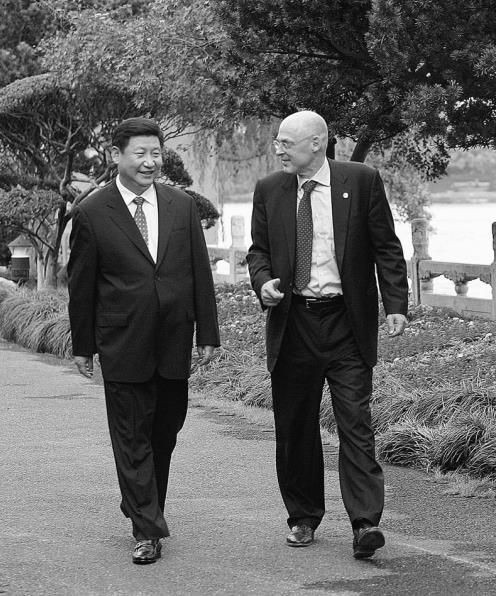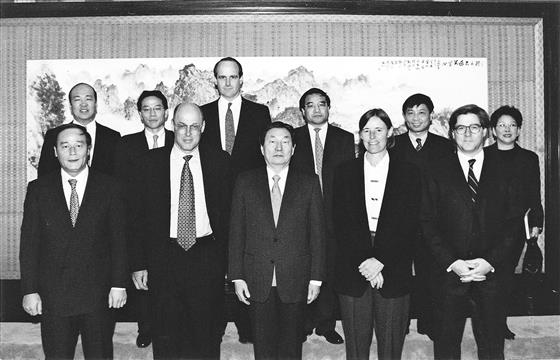
(2006,Hangzhou, XI jinping and H.M.Paulson)
发言:张京宏
日期:2022.4.22 Netherlands Hague
美国前财长鲍尔森(H.M.Paulson)1970年毕业于哈佛大学MBA,是美国高盛公司前总裁,美国前财长(2006-2009),芝加哥大学鲍尔森基金会掌控人。鲍尔森也有翻译成保尔森。鲍尔森早年写过《峭壁边缘》一书,2015年出版《与中国打交道》(Dealing with China:An insider Unmasks the new Economic Superpower)一书,是英文版本。2016年鲍尔森到香港交流,香港中文大学出版社出版了繁体中文版(ISBN978-957-13686-9-6)。目前中国大陆简体中文版还没有出版。这本书视角独特,是从另一个角度理解社会主义经济理论和社会主义市场经济的一把有效钥匙。之所以中文简体版本没出版,是因为其文字表达过于直白,或不适合在中国广泛出版传播。马克思在《黑格尔法哲学批判导言》中指出:市民社会决定国家和法(马克思:《黑格尔法哲学批判导言》,《马克思恩格斯选集》第1卷,人民出版社1974年版,第2~15页)。所谓市民社会,结合中国实际来说就是两个字:国情。国情决定了出版传播审查的尺度。中国人口太多,普遍教育程度不高,有些传播需要从国情出发进行管控。但其中有利的部分,可以吸收学习,在知识分子层面和精英阶层中传播。
一
《与中国打交道》一书主要内容包括三个部分。
第一部分是鲍尔森作为美国高盛公司总裁期间和中国政府关于大型国企改革的交往,这对应社会主义市场经济最重要的国企改革。书中列举了中国电信上市、中石油国企改革等。鲍尔森在书中说,他是1997年2月25日去北京中南海紫光阁四层小楼见朱镕基总理的——他强调说,中国要见重要领导需要关系,需要人介绍,他找的介绍人是建设银行行长王岐山。鲍尔森说,王岐山干工作扎实热情,帮自己介绍了副总理朱镕基,自己也投桃报李,介绍了建设银行和摩根士丹利合作,组建了中金公司,中金公司组建初期的负责人就是朱镕基秘书李剑阁。在鲍尔森的书中,特别是英文版原文描写中,高盛公司和中国政府领导合作推进国企改革,就和县城里小微企业搞市场差不多,都需要找熟人,找关系。这种过于真实的描写,或是大陆方面未出版的因素之一。王岐山至今还是党和国家领导人,经常和七常委同时出面。在鲍尔森描述中,王岐山实干,热情,活脱脱一个商业银行支行行长气息——就差描写皮包里装着中华烟和银行萝卜头业务章了。鲍尔森说,在王岐山当建设银行行长时候他就能看出,王岐山能当更大的官,因为业务扎实,热情,肯跑市场和找客户。鲍尔森说董建华(香港特首1997-2005)也是靠谱做业务的。

(Zhu rongji ,Wang qishan and H.M.Paulson)
第二部分是鲍尔森作为美国财政部长(2006-2009)和中国在WTO框架内合作中涉及汇率、环保、能源以及人权方面的交往与角力。在这部分内容中,鲍尔森看到了中国和美国发展过程中出现的矛盾和冲突,指出当今世界上最重要的双边关系就是中美关系,双方应当谋求和平相处。鲍尔森对一种观点——新兴国家和老牌发达国家之间必然发生战争——抱有辩证看法,认为战争对各方并不是最好选择。
第三部分是鲍尔森对中国当前政策的近距离观察和深刻评判。鲍尔森说美国近年来贫富悬殊更大,国内经济停滞,美国国内出现一种观点,说美国在全球贸易中吃亏了,包括和中国贸易中也吃亏了,于是有了特朗普总统时期中美贸易战冲突加剧。鲍尔森对习主席领导下当前中国政策也进行了中美关系框架视角的深刻分析和评判。
二
美国文化是主张传播的,和中国国内主张低调是相反的。美国人写一本书,必须宣传,鲍尔森也不例外,鲍尔森的《与中国打交道》获得2015年纽约最畅销书籍排名,宣传口号是“不得不看的书”之一。鲍尔森认为传播著作比著作本身还重要,只有传播著作才能让更多的读者了解(张京宏:长篇小说《卤阳湖》,天津人民出版社,2021年版)。问题是,鲍尔森本人无法用汉语写作,也无法用汉语阅读,他的英文版翻译成中文后,确实太过直白了,以至于在香港繁体中文版出版后,简体中文版至今未传播。中国国内京东、当当图书等关键字,都是“怎样与中国人打交道”的书,和鲍尔森的著作不是可以比较的,甚至没可比性可言。
当然,忠实翻译的繁体中文版本和英文版意思是一致的。这些翻译品质是可靠的。
三
鲍尔森是“华盛顿共识”的支持者,他在高盛公司工作了三十二年,热衷于私有化。鲍尔森自己说,他是普罗米修斯,向中国传播国际资本市场的火苗,来改制中国大型国企。鲍尔森在书中说,他和朱镕基副总理交谈结束,从中南海回酒店的路上,看到了毛主席的画像挂在城墙上,他对着画像默默地说,我是美国资本家,现在要改组你们原来邮电部下属亏损严重的电信公司,要帮助中国电信上市,让外国投资者买中国电信股份了,你老人家若在世,会同意吗?这些都是鲍尔森书里写的原汁原味的内容。
鲍尔森说,中国社会主义市场经济改革,邓小平是总设计师,江主席是总承包方,朱镕基副总理是施工队。鲍尔森认为国企改革背景是三角债和国企巨亏,认为下岗分流是党中央和工人阶级一个交易——以经济增长换取政治稳定。中国电信从那时起,就再没亏损过。
四
读书应当开阔人民的视野。但书本身因作者不同就有很大不同。有的书是荆棘,布满了刺,有的书则需要区分读者层次。
作为世界读书日,向中国知识分子和精英阶层介绍鲍尔森的《与中国打交道》——这本书对中国没有敌意,就是直白了些,华尔街资本家写的而已。鲍尔森的潜在立场是自由主义和私有化,这是我们需要识别的。
五
如果认真阅读《与中国打交道》一书,那么对当前中国国策会有更深刻认识。远的不说,对当前中国上海抗疫政策就会有更高层次理解和认识,会少一些抱怨,多一些理解。
每个人在疫情抗击中都有各种困难,有的在上海封闭一个多月不能出去,有的在外面一个多月不能回沪,各有不同层面的代价和牺牲。但从全局看,会明白长远利益——上海抗疫封控期间,有少数发国难财的黑心快递小哥[1],有吃回扣的居委工作人员,有少数漫天加价赚钱的小区团购团长,也可能有控制物流和通行证黑幕交易的权力灰色,更有中饱私囊或玩忽职守的科级处级干部[2],还有问题肉菜保供单位选择的疏忽或猫腻[3],等等,但同时也有大量辛苦奉献的一线志愿者和居委,更有大量医务人员的辛勤,也有互助和人心温暖的诸多实例。阅读《与中国打交道》一书,能让读者看问题更全面,会多一些思考,少一些偏激,多一些理解,少一些片面指责。
特此推荐。(完)
注释:
[1]这是一小部分,绝大多数快递从业者还是本分和良知,并兢兢业业贡献的。
[2]目前上海浦东、闵行等已经处理了多名干部,具体参见上海发布等媒体APP。
[3]问题猪肉等上海警方已经立案,涉嫌销售假冒伪劣相关犯罪。
World Book Day Sharing: A brief introduction to the book "Dealing with China" by former US Treasury Secretary Paulson
Speaker: Zhang Jinghong
Date: 2022.4.22 Netherlands Hague
Former US Treasury Secretary Paulson (H.M.Paulson) graduated from Harvard University with an MBA in 1970. He is the former president of Goldman Sachs, the former US Treasury Secretary (2006-2009), and the controller of the Paulson Foundation at the University of Chicago. Paulson also has a translation into Paulson. Paulson wrote "The Edge of the Cliff" in his early years and published "Dealing with China: An insider Unmasks the new Economic Superpower" in English in 2015. In 2016, Paulson went to Hong Kong for exchange, and the Chinese University of Hong Kong Press published the traditional Chinese version (ISBN978-957-13686-9-6). The simplified Chinese version in mainland China has not yet been published. This book has a unique perspective and is an effective key to understanding socialist economic theory and socialist market economy from another perspective. The reason why the simplified Chinese version was not published is because its textual expression is too straightforward, or it is not suitable for widespread publication and dissemination in China. Marx pointed out in "Introduction to the Critique of Hegel's Philosophy of Right": Civil society determines the state and the law (Marx: "Introduction to the Critique of Hegel's Philosophy of Right", Selected Works of Marx and Engels, Vol. 1, People's Publishing House, 1974 Edition, Vol. 2 ~15 pages). The so-called civil society, combined with China's actual situation, is two words: national conditions. National conditions determine the scale of publication and dissemination review. China has a large population and generally has a low level of education. Some transmissions need to be controlled based on national conditions. But the good part of it is that learning can be absorbed and spread at the intellectual level and among the elite.
One
The book "Dealing with China" consists of three parts.
The first part is Paulson's interactions with the Chinese government on the reform of large state-owned enterprises during his tenure as president of Goldman Sachs, which corresponds to the most important reform of state-owned enterprises in the socialist market economy. The book lists the listing of China Telecom and the reform of state-owned enterprises in PetroChina. Paulson said in the book that he went to see Premier Zhu Rongji in the small building on the fourth floor of Ziguang Pavilion, Zhongnanhai, Beijing on February 25, 1997. He emphasized that China needs relationships and introductions to meet important leaders. The introducer is Wang Qishan, President of China Construction Bank. Paulson said that Wang Qishan was solid and enthusiastic in his work. He introduced Vice Premier Zhu Rongji to himself. Zhu Rongji's secretary Li Jiange. In Paulson's book, especially in the original description in the English version, Goldman Sachs and the Chinese government leaders cooperate to promote the reform of state-owned enterprises, which is similar to the small and micro enterprises in the county. They all need to find acquaintances and find relationships. This overly realistic description may be one of the factors that the mainland has not published. Wang Qishan is still the leader of the party and the state, often appearing at the same time as the Seventh Standing Committee. In Paulson's description, Wang Qishan is hard-working, enthusiastic, and looks like the president of a commercial bank sub-branch - it is almost enough to describe the Chinese cigarette and the bank's radish head business seal in the leather bag. Paulson said that when Wang Qishan was the president of China Construction Bank, he could see that Wang Qishan could become a bigger official because of his solid business, enthusiasm, and willingness to run the market and find customers. Paulson said that Tung Chee-hwa (Hong Kong Chief Executive 1997-2005) was also a reliable businessman.
The second part is the exchanges and wrestling between Paulson as US Treasury Secretary (2006-2009) and China in the WTO framework involving exchange rate, environmental protection, energy and human rights. In this part, Paulson saw the contradictions and conflicts in the development process of China and the United States, and pointed out that the most important bilateral relationship in the world today is the relationship between China and the United States, and the two sides should seek peaceful coexistence. Paulson takes a dialectical view of the idea that war is bound to happen between emerging and established developed nations, and that war is not the best option for all parties.
The third part is Paulson's close observation and in-depth evaluation of China's current policies. Paulson said that the disparity between the rich and the poor in the United States has become wider in recent years, and the domestic economy has stagnated. There is a view in the United States that the United States suffers from global trade, including trade with China, and thus has the Trump presidency. The U.S.-China trade war has intensified. Paulson also made an in-depth analysis and evaluation of the current China policy under the leadership of President Xi from the perspective of the framework of Sino-US relations.
Two
American culture advocates dissemination, which is the opposite of China's domestic advocate low-key. When Americans write a book, they must promote it, and Paulson is no exception. Paulson's "Dealing with China" won the 2015 New York Best-Selling Book Ranking, and the slogan is one of the "must-read books". Paulson believes that the dissemination of works is more important than the works themselves, and only by dissemination of works can more readers understand (Zhang Jinghong: novel "Luoyang Lake", Tianjin People's Publishing House, 2021 edition). The problem is that Paulson himself cannot write in Chinese, nor can he read in Chinese. His English version, translated into Chinese, is indeed so straightforward that after the traditional Chinese version was published in Hong Kong, the simplified Chinese version has not yet spread. . Key words such as JD.com and Dangdang Books in China are all books on "how to deal with the Chinese". They are not comparable to Paulson's works, or even comparable.
Of course, the traditional Chinese version and the English version of the faithful translation have the same meaning. The quality of these translations is reliable.
Three
Paulson, a supporter of the "Washington Consensus," worked for Goldman Sachs for 32 years and was keen to go private. Paulson himself said that he is Prometheus, spreading the flames of the international capital market to China to restructure large Chinese state-owned enterprises. Paulson said in the book that after his conversation with Vice Premier Zhu Rongji, on the way back to the hotel from Zhongnanhai, he saw the portrait of Chairman Mao hanging on the city wall. You used to be a telecommunications company under the Ministry of Posts and Telecommunications, which suffered serious losses. You want to help China Telecom go public and let foreign investors buy shares in China Telecom. If your old man was alive, would you agree? These are the original content written in Paulson's book.
Paulson said that for China's socialist market economy reform, Deng Xiaoping is the chief architect, Chairman Jiang is the general contractor, and Vice Premier Zhu Rongji is the construction team. Paulson believes that the background of state-owned enterprise reform is triangular debt and huge losses of state-owned enterprises, and believes that the separation of laid-offs is a transaction between the Party Central Committee and the working class - economic growth in exchange for political stability. China Telecom has never lost money since then.
Four
Reading should broaden people's horizons. But the books themselves vary greatly from author to author. Some books are thorns, covered with thorns, and some books need to distinguish the level of readers.
As World Book Day, introduce Paulson's "Dealing with China" to Chinese intellectuals and elites - this book is not hostile to China, just plain, written by Wall Street capitalists. Paulson's underlying positions are liberalism and privatization, and that's what we need to identify.
Five
If you read the book "Dealing with China" carefully, you will have a deeper understanding of the current state policy of China. Not to mention, there will be a higher level of understanding and understanding of the current anti-epidemic policy in Shanghai, China, and there will be less complaints and more understanding.
Everyone has various difficulties in the fight against the epidemic. Some people are closed in Shanghai and cannot go out for more than a month, while others cannot return to Shanghai for more than a month. Each has different levels of cost and sacrifice. But from the overall perspective, we will understand the long-term interests-during the anti-epidemic lockdown in Shanghai, there are courier guys who are struggling to make money, neighborhood committee staff who take rebates, community group buying leaders who make money by increasing prices, and control logistics and passes. The power of shady trading is gray, and there are even department-level cadres who are full of personal pockets or neglect their duties, and negligence or tricks in the choice of the problem meat and vegetable supply units, etc., but at the same time, there are also a large number of front-line volunteers and neighborhood committees who have worked hard and dedicated themselves. , and the hard work of a large number of medical staff, as well as many examples of mutual assistance and warm hearts. Reading the book "Dealing with China" will enable readers to see issues more comprehensively, think more, be less extreme, understand more, and make less one-sided accusations.
Hereby recommended. (Finish)
